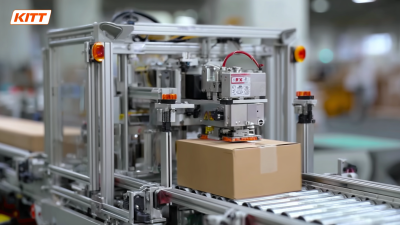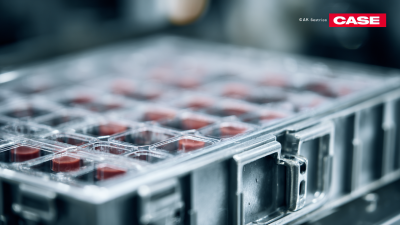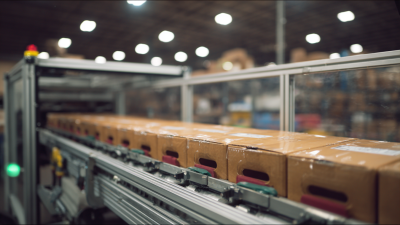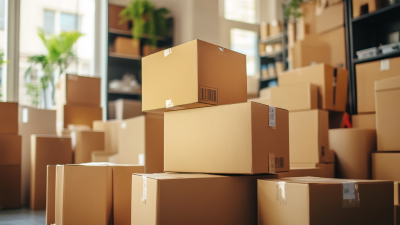Ultimate Checklist for Choosing the Right Automatic Box Taping Machine
As businesses increasingly seek efficiency in their packaging processes, the demand for an Automatic Box Taping Machine has surged. According to a recent report by MarketsandMarkets, the automated packaging market is projected to reach USD 80.6 billion by 2025, with box sealing and taping systems playing a crucial role in this growth. The high-speed application and consistency offered by automatic taping machines not only enhance productivity but also reduce labor costs significantly—up to 30% in some cases. As such, choosing the right Automatic Box Taping Machine is essential for optimizing operations and ensuring that your packaging meets industry standards. This ultimate checklist will guide you through key considerations to make an informed decision in selecting the most suitable machine for your business needs.

Key Features to Look for in an Automatic Box Taping Machine
When selecting the right automatic box taping machine, it's essential to consider several key features that will enhance efficiency and productivity. The rising demand in the carton sealing market, driven by the food and beverage industry as well as the booming e-commerce and logistics sectors, highlights the importance of selecting advanced machinery. The market for carton sealers is projected to experience significant growth, offering insights into the critical specifications you should prioritize, including speed, adaptability, and ease of operation.
Incorporating automated features such as programmable settings can greatly streamline the packing process. As noted in industry reports, advancements in packaging machinery can allow for faster adjustments to tape widths and box dimensions, ensuring compatibility across a variety of product sizes. Furthermore, with developments in robotics and automation technology, modern taping machines are increasingly designed to overcome the limitations of manual processes, thereby improving overall packaging efficiency.
Investing in an automatic box taping machine with these features not only boosts productivity but also allows businesses to meet rising consumer demands more effectively. As the beverage carton packaging machinery market is expected to grow from USD 1.24 billion in 2025 to USD 1.89 billion by 2034, it’s crucial for companies to stay ahead by choosing equipment that supports operational agility and robust production capabilities.
Understanding Different Types of Tape and Their Applications
In recent years, the healthcare sector has experienced a surge in demand for various products, which has significantly impacted the market for automatic box taping machines. This growth can be attributed to the rising requirements for packaging solutions that ensure safety and compliance in the distribution of medical supplies. With the ongoing challenges brought by the pandemic, industries have been compelled to enhance their packaging efficiency to keep pace with increased production and logistical demands.

When selecting an automatic box taping machine, it is essential to understand the different types of tape available and their specific applications, especially within the medical field. For instance, acrylic tape is known for its strong adhesion and resistance to UV rays, making it ideal for long-term storage of medical devices. On the other hand, foam tape offers excellent cushioning properties, which is crucial for protecting delicate items during transport. Additionally, PVC tape is widely used for moisture sealing in packaging, reinforcing the importance of choosing the right tape for compliance and safety in medical applications. Understanding these nuances can lead to better operational efficiency and enhanced product protection in the healthcare logistics chain.
Factors Affecting the Performance of Taping Machines
When selecting the right automatic box taping machine, understanding the factors that affect its performance is crucial. Key elements such as tape adhesion, machine speed, and operational ease significantly impact how effectively the machine meets your packaging needs. For instance, machines that allow for adjustments in tape tension can enhance adhesion to various box materials, ensuring a secure seal.
**Tips:** Consider evaluating the hydraulic performance of the taping machine, similar to how researchers assess irrigation tape systems. A well-designed machine that operates efficiently under varying conditions can greatly increase productivity. Additionally, pay attention to the machine’s compatibility with different tape types, as this will influence adhesive performance and overall efficiency.
Another important factor is the machine's automation capabilities. Modern taping machines can incorporate machine learning algorithms that optimize performance based on historical data, much like advancements seen in other fields, such as thermal performance predictions in solar water heaters. This ensures you get the most efficient operation tailored to your specific requirements, reducing wastage and enhancing operational output.
Performance Factors for Automatic Box Taping Machines
This chart illustrates various factors affecting the performance of automatic box taping machines, including speed, reliability, ease of use, and maintenance requirements.
Cost Considerations: Budgeting for Your Taping Solution
When it comes to selecting the right automatic box taping machine, one of the most significant factors is your budget. According to a recent report by IBISWorld, businesses in the packaging machinery industry have experienced a growth rate of about 3.5% annually. This trend underscores the importance of investing wisely in equipment that meets your operational needs without breaking the bank. Establishing a clear budget from the outset can help streamline the selection process, allowing you to focus on machines that offer the best return on investment.
Tips: Always consider the total cost of ownership, which includes not just the purchase price, but also maintenance, repairs, and the cost of any consumables. Many companies opt for leasing options to manage cash flow better while still accessing high-quality machinery. Remember, a cheaper machine may lead to higher operational costs over time, so evaluate the long-term benefits of each option available.
Furthermore, it’s crucial to understand the expected volume of packaging you’ll handle daily. According to the Freedonia Group, demand for automated packaging solutions is projected to rise, reinforcing the need for a solution that can accommodate future growth. Investing in a machine that scales with your production needs will ensure you remain competitive without incurring excessive costs related to scaling up.

Maintenance Tips for Ensuring Longevity of Your Taping Equipment
Maintaining your automatic box taping machine is crucial for its longevity and optimal performance. Regular maintenance can significantly reduce downtime and repair costs. According to recent industry reports, machines that undergo routine inspections can extend their lifespan by 20-30%. Moreover, ensuring that moving parts are lubricated and that tapes are stored correctly can help prevent wear and tear, maintaining consistent operation.
It’s also essential to stay updated with the latest technological advancements that enhance machine efficiency. As reported in recent innovations, integrating smart sensors can provide real-time data on machine performance, alerting operators to potential issues before they escalate. This proactive approach not only safeguards the equipment but also optimizes the taping process, which can improve overall productivity in packaging operations. The transition towards smarter, more efficient machinery is a trend that presents significant advantages for businesses aiming to enhance their operational capabilities.
Ultimate Checklist for Choosing the Right Automatic Box Taping Machine - Maintenance Tips for Ensuring Longevity of Your Taping Equipment
| Dimension | Details |
|---|---|
| Machine Type | Random Flap Tape Machine |
| Tape Type Compatibility | PVC, BOPP, Paper |
| Max Box Size | 24"x 24"x 24" |
| Speed | Up to 30 boxes/min |
| Power Consumption | 220V, 50Hz |
| Maintenance Frequency | Monthly |
| Recommended Lubricant | Synthetic Oil |
| Common Issues | Tape jamming, Misalignment |
| Warranty Period | 2 Years |
Related Posts
-

Discovering Innovative Alternatives to the Best Automatic Case Sealer for Your Packaging Needs
-

How to Identify Reliable Suppliers for the Best Case Sealer Without Compromise
-

Adhering to Industry Standards: How to Choose the Best Automatic Case Sealer for Optimal Efficiency
-

Advantages of Using an Efficient Box Taping Machine for Streamlined Packaging Operations
-

Navigating Global Trade Challenges with the Best Box Taping Machine from China
-

Carton Taping Machine Trends for 2025 and Best Practices for Increasing Efficiency
